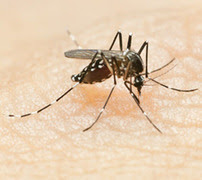

The best way to prevent Zika? Avoid mosquito bites!
Mosquito bites can be more than just annoying and itchy. They can make you really sick. Zika virus is spread to people through mosquito bites. The most common symptoms of Zika are fever, rash, joint pain, and conjunctivitis (red eyes). The illness is usually mild with symptoms lasting from several days to a week. Severe disease requiring hospitalization is uncommon. Learn More >>
Avoid Mosquito Bites
Are you planning international travel to the tropics? Protect yourself and your family from mosquito bites that can make you sick.
Mosquito bites can be more than just annoying and itchy. They can make you really sick. Protect yourself and your family when traveling overseas. Wearing insect repellent is the best way to prevent diseases spread by mosquitoes.
Chikungunya
The most common symptoms of chikungunya virus infection (chikungunya) are sudden onset of a high fever and joint pain. Other symptoms may include headache, muscle pain, joint swelling, or rash. Infection with chikungunya virus is rarely fatal, but the joint pain can often be severe and debilitating. Most patients recover in about a week, although long-term joint pain occurs in some people. Infection is thought to provide lifelong immunity. Outbreaks have occurred in countries in Africa, Asia, Europe, and the Indian and Pacific Oceans.
In late 2013, chikungunya virus was found for the first time in the Americas on islands in the Caribbean. Since then, almost 2 million cases have been reported. There is no vaccine to prevent or medicine to treat chikungunya. Mosquitoes become infected when they bite someone already infected with the virus. Infected mosquitoes can then spread the virus to other people. Though chikungunya is not common in the continental United States, Puerto Rico and the U.S. Virgin Islands have had large outbreaks.
Dengue
Forty percent of the world's population lives in an area at risk for dengue and an estimated 390 million people per year are infected with the viruses. Dengue is a disease caused by one of four viruses: dengue virus 1, 2, 3, and 4. Because there are four different viruses, it is possible for someone to get dengue up to four times. Dengue is a leading cause of illness and death in the tropics and subtropics.
Like chikungunya, there is no vaccine to prevent or medication to treat a dengue infection. Most infected people infected with dengue have mild or no symptoms. About one in four people who are infected with dengue will develop some symptoms of disease. Mild symptoms of infection begin with a fever and severe headache, pain behind the eyes, joint and muscle pain, and rash. Dengue symptoms can quickly become severe and even fatal. Early recognition of severe disease, followed by close management by a healthcare provider is critical.
Zika
Zika virus is spread to people through mosquito bites. The most common symptoms of Zika virus disease (Zika) are fever, rash, joint pain, and conjunctivitis (red eyes). The illness is usually mild with symptoms lasting from several days to a week. Severe disease requiring hospitalization is uncommon.
CDC has issued a travel alert (Level 2-Practice Enhanced Precautions) for people traveling to regions and certain countries where Zika virus transmission is ongoing: Brazil, Colombia, El Salvador, French Guiana, Guatemala, Haiti, Honduras, Martinique, Mexico, Panama, Paraguay, Puerto Rico, Suriname, and Venezuela.
This alert follows reports in Brazil of microcephaly and other poor pregnancy outcomes in babies of mothers who were infected with Zika virus while pregnant. However, additional studies are needed to further characterize this relationship. More studies are planned to learn more about the risks of Zika virus infection during pregnancy.
Until more is known, and out of an abundance of caution, CDC recommends special precautions for pregnant women and women trying to become pregnant:
- Pregnant women in any trimester should consider postponing travel to the areas where Zika virus transmission is ongoing. Pregnant women who do travel to one of these areas should talk to their doctor or other healthcare provider first and strictly follow steps to avoid mosquito bites during the trip.
- Women trying to become pregnant who are thinking about becoming pregnant should consult with their healthcare provider before traveling to these areas and strictly follow steps to prevent mosquito bites during the trip.
Like chikungunya and dengue, there is no vaccine to prevent or medicine to treat Zika. Travelers can protect themselves from this disease by taking steps to prevent mosquito bites. When traveling to countries where Zika virus (see map) or other viruses spread by mosquitoes have been reported, use insect repellent, wear long sleeves and pants, and stay in places with air conditioning or that use window and door screens.
Planning a trip? Do your homework before traveling.
Make a check list of everything you'll need for an enjoyable vacation and use the following resources to help you prepare.
- Pack a travel health kit. Remember insect repellent and use it to prevent mosquito bites.
- Learn about destination-specific health risks and recommendations by visiting CDC Travelers' Health website.
- See a healthcare provider familiar with travel medicine, ideally four to six weeks before your trip. Go to the Find a Clinic webpage for help in finding a travel medicine clinic near you.
After travel
Visit your healthcare provider right away if you develop a fever, headache, rash, muscle or joint pain.
- Tell your doctor about your recent international travel.
- Visit the Getting Sick after Travel webpage for more information.





















.png)












No hay comentarios:
Publicar un comentario